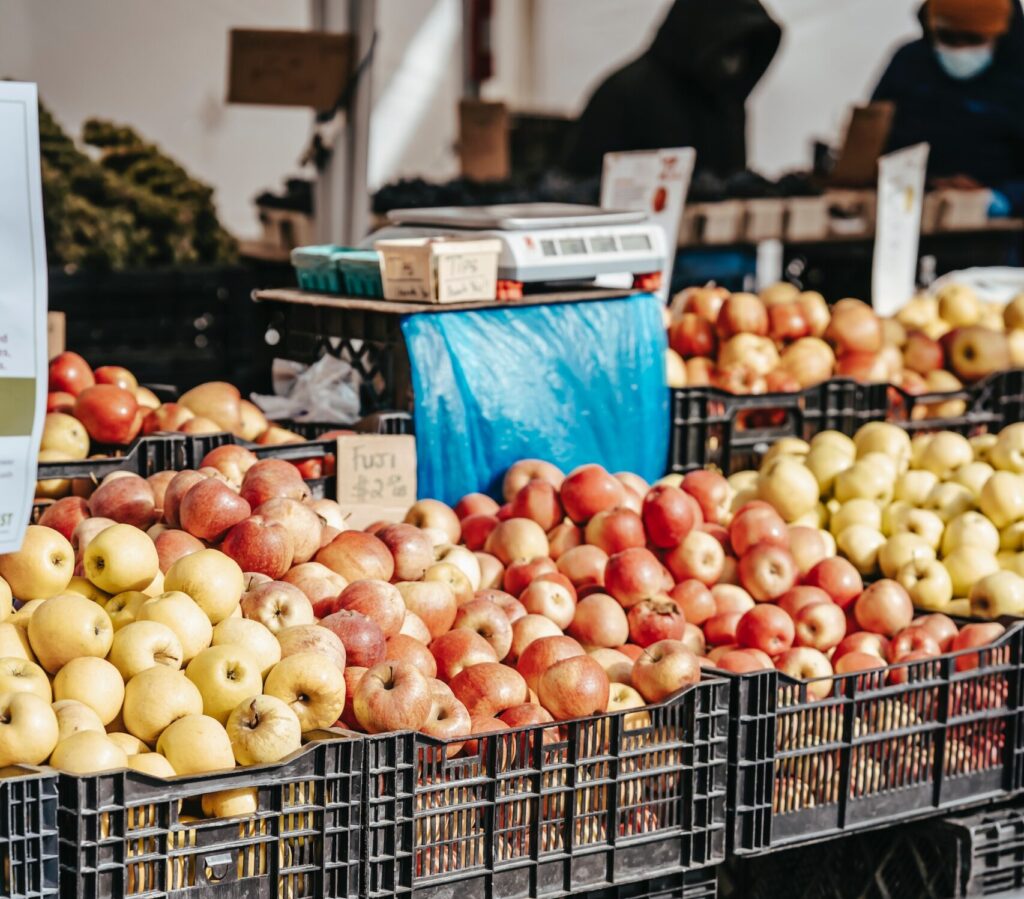Here’s a short dialogue in Mandarin Chinese about buying fruit at a fruit shop with sentence breakdowns:
Good morning! Would you like to buy some fruit?
|
|
good morning |
|
|
(do) you want |
|
|
(to) buy some here |
|
|
what Here, |
|
|
fruit |
|
|
<question particle> This turns what would be a statement into a yes-or-no question. So, in this context, |
Hello! I would like to buy one jin (0.5 kilograms) of apples and some oranges.
|
|
hello |
|
|
I want to buy |
|
|
one jin A “jin” is 0.5kg |
|
|
apple(s) |
|
|
and |
|
|
some / a few |
|
|
orange(s) |
Alright, these apples are very fresh, and the oranges are also good. How many oranges would you like?
|
|
Alright |
|
|
these |
|
|
apples |
|
|
(are) very |
|
|
fresh |
|
|
oranges |
|
|
also not bad here, “not bad” really means “good”, so this really means “also good” |
|
|
you want |
|
|
how many |
|
|
orange(s) Most of the time, you don’t need to change a noun to indicate it’s plural. For example: |
Just give me six oranges.
|
|
give me Literally broken down this means – – |
|
|
six pieces of orange Broken down this means – – – |
|
|
(that’s enough) can be translated as “just fine” or “that’s enough.” So, the sentence means “Give me six oranges, that’s enough.” It suggests that the speaker wants exactly six oranges, and they don’t need more than that |
Alright, one jin of apples and six oranges.
|
|
Alright |
|
|
One piece of |
|
|
and |
|
|
six oranges |
May I ask, how much are these apples per jin? Also, how much does one orange cost?
|
|
excuse me / may I ask |
|
|
these apples |
|
|
how much |
|
|
one jin In Chinese a “jin” is half a kilogram (approximately 1.1 pounds). Check out our post – What is a Chinese Jin? |
|
|
also |
|
|
orange(s) |
|
|
how much (for) one |
Apples are five yuan per jin, and one orange costs two yuan.
|
|
apple |
|
|
one jin (half a kilogram) |
|
|
five kuai a kuai |
|
|
orange (fruit) |
|
|
one piece |
|
|
two kuai a kuai |
Alright, give me one jin of apples and six oranges.
|
|
alright |
|
|
give me |
|
|
one jin (of) apples |
|
|
and |
|
|
six oranges |
Alright, please pay seventeen yuan.
|
|
alright |
|
|
please pay |
|
|
17 yuan |
Grammar notes
- Politeness: In Mandarin Chinese, it’s common to use polite phrases like
您 要 and请 问 when interacting with strangers or in a customer service context. - Measure Words: Measure words (量词 – liàngcí) are used when specifying quantities of items. For example,
一 斤 苹 果 uses斤 as a measure word for apples, and六 个 橙 子 个 as a measure word for oranges. Check out our post – Chinese Classifiers: What are they and how to use them. - Cost and Price: To indicate the cost or price, Mandarin often uses the structure
多 少 钱 , which means “how much money.” - Counting: Numbers like
一 for one,六 for six, and十 七 for seventeen are used in the dialogue. Chinese numbers are relatively straightforward compared to English. - Currency: The Chinese word for “yuan” is
块 , and it’s used in the dialogue to denote the currency.

